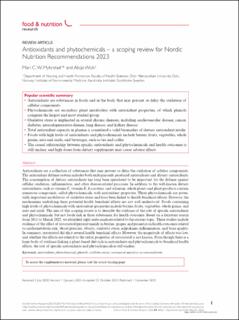| dc.description.abstract | Antioxidants are a collection of substances that may prevent or delay the oxidation of cellular components.
The antioxidant defense system includes both endogenously produced antioxidants and dietary antioxidants.
The consumption of dietary antioxidants has long been speculated to be important for the defense against
cellular oxidation, inflammation, and other disease-related processes. In addition to the well-known dietary
antioxidants, such as vitamin C, vitamin E, β-carotene, and selenium, whole plants and plant-products contain
numerous compounds, called phytochemicals, with antioxidant properties. These phytochemicals are poten-
tially important modulators of oxidative stress and have been linked to health beneficial effects. However, the
mechanisms underlying these potential health beneficial effects are not well understood. Foods containing
high levels of phytochemicals with antioxidant properties include berries, fruits, vegetables, whole grains, and
nuts and seeds. The aim of this scoping review is to describe the evidence of the role of specific antioxidants
and phytochemicals, but not foods rich in these substances, for health outcomes. Based on a literature search
from 2011 to March 2022, we identified eight meta-analyses related to the current topic. These studies include
evidence of the effect of resveratrol (present mainly in berries, grapes, and peanuts) on health outcomes related
to cardiometabolic risk, blood pressure, obesity, oxidative stress, adipokines, inflammation, and bone quality.
In summary, resveratrol did elicit several health beneficial effects. However, the magnitude of effects was low,
and whether the effects are related to the redox properties of resveratrol is not known. Even though there is a
large body of evidence linking a plant-based diet rich in antioxidants and phytochemicals to beneficial health
effects, the role of specific antioxidants and phytochemicals is still unclear. | en_US |

